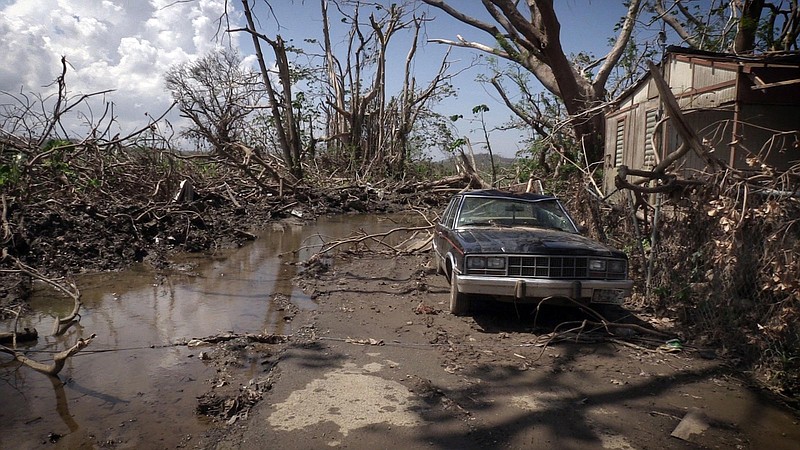TOA BAJA, Puerto Rico-Three weeks after Hurricane Maria devastated Puerto Rico, killing at least 48 people, Jose Vargas surveyed street after street lined with mounds of soaking garbage mixed with mud, trees and sometimes dead animals.
You couldn't make a better breeding ground for rats, roaches and all sorts of nasty diseases, the public health volunteer said. And every day the fetid piles stay there, the risk of an epidemic grows.
"We're already building the next disaster," he said.
Maria turned life for many of Puerto Rico's 3.4 million residents into a nightmarish scramble for food and water as overtaxed authorities struggle to deliver supplies, save lives and restore basic services.
An estimated 80 percent of the island still doesn't have power and 40 percent have no running water.
Given the scale of the damage, it's no surprise that trash pickup isn't a priority. But public health experts fear that the rotting mounds are setting the stage for a new wave of problems.
Beyond the deaths directly attributed to the storm, officials say four other fatalities may have been caused by leptospirosis-a bacterial infection caused by rodent urine tainting the water from springs. Six more people are being evaluated for the disease, which can lead to kidney damage, liver failure and meningitis.
But if the island's debris and garbage aren't dealt with quickly, those numbers will likely grow, experts fear.
Jose Vargas Vidot is a doctor and local senator who has spent more than two decades providing emergency medical services in places like Haiti, Guatemala and Nicaragua. Since Maria hit, his organization, Iniciativa Comunitaria, has been operating a free clinic in a school in Toa Baja.
The low-lying town, about 20 minutes from the capital, San Juan, was badly flooded during the storm. And now its narrow roads are piled with wet mattresses, mud-caked teddy bears and warped wood dressers.
Vidot said the storm had "unmasked" weaknesses in the island's health care system and caught the government flat-footed.
"There's no strategy for public hygiene," he said. "It's not just about clearing roads but picking up debris."
The mountains of garbage, he said, are "rats' nests and full of dead animals. And they'll bring powerful contagious (diseases) when the rains return."
In addition, puddles of muddy water are likely to become breeding grounds for mosquitoes and the illnesses they can carry-dengue, chikungunya and Zika.
And while the island is still water-logged, more than 1 million people don't have water from their taps. That means that many are still living with the dirt and grime dragged in by the storm.
At the Iniciativa Comunitaria clinic, doctors reported an increase in cases of pink eye, skin rashes and diarrhea that often come with lack of cleanliness.
Authorities are aware of the risks. Alarmed by the reports of leptospirosis and news that people in some villages are drinking from potentially tainted streams and springs, the government began distributing water purification pills and filters this past week.
But critics say the initiative, which came 20 days after Maria hit, was too little, too late.
Puerto Rico Health Secretary Rafael Rodriguez defended his office, saying he'd been instructing islanders for months not to drink untreated water.
"Because of this, there haven't been more deaths," he said at a news conference.
"If we hadn't been concerned about prevention, and how to prevent diseases, we would have had an epidemic outbreak, and thank God that's not happening right now on the island."
Gov. Ricardo Rossello said his office has been working with the Department of Health and Human Services and other agencies to quickly identify illnesses and develop mitigation strategies.
"We are not waiting for illnesses and diseases to occur in Puerto Rico," he said. "We are being proactive about this."
But some aren't waiting for water to return and for the government to act.
Marielis Nieves, a nursing assistant, said she hadn't let her two young sons leave the house for days because she was afraid they might romp through the mud and garbage piled up on the street. Her 3-year-old had already had a fever and broken out with a rash.
"I don't want them to get sick but I can't keep them clean without water," she said.
In the meantime, she has a more permanent solution for the health care crisis: She's taking her children to Ohio.

